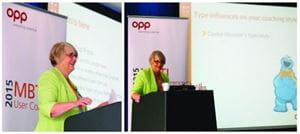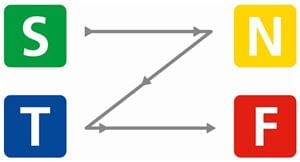Coaching using type: insights from Myers, Jung, Adler, Cookie Monster and you! Part 2
Jean Kummerow PhD - psychologist and author

This is the second posting based on Jean Kummerow’s keynote presentation at OPP’s MBTI® User’s Conference on 19 June 2015. The first post gave background on the ‘Four Crucial Cs’ Adlerian model. This second part describes how to use type within that model.
Personality type is a tool that interacts with the Crucial Cs – Connect, Capable, Count, and Courage – helping clients achieve each one of them.
When clients don’t Connect, they are subject to peer pressure and/or may seek attention in negative ways. They may need help in figuring out how to connect – for example, think about how Introverts might like to connect with others, versus Extraverts. This might also include working on communication skills, a ready-made application of type.
I once had an ESFP coaching client, the Executive Director of an NGO whose mission was to encourage economic development in West African villages. Her Board of Directors was comprised of NTs who thought she wasn’t doing her job well. Yes, there was a disconnect! We spent time talking about different communication styles for different types, and she began to flex her style in meetings with a positive result.
When clients don’t feel Capable, they feel inadequate. Personality type descriptions offer quick ways to identify some potential capabilities. Of course, these also need to be checked out in reality – the fact that it’s the client’s type preference doesn’t mean it’s an automatic skill. I’ve had a number of coaching clients who doubt their capabilities, but upon reading their type descriptions begin to see areas where they are capable. Then we can discuss possible places to use their capabilities.
Type dynamics also gives us some ideas of what might not come so naturally to a client. The Dominant Thinking type might need to learn more ways of showing appreciation to others. That doesn’t mean they need to become Feeling types, but rather develop at least basic skills in that area.
One technique that enables you to develop a particular skill that comes more naturally to another type is to find someone of that type whom you both like and respect. Observe how they demonstrate that skill. Then figure out a way to adapt it to your own style. If you simply mimic them, you will come off as phony and insincere.
When clients don’t feel they Count, they feel insignificant and unnecessary. A study by Seligman found that the happiest workers were those who felt that they made real contributions and that their occupation was congruent with their interests and values. For this C, we help people identify what really matters to them.
With personality type we know that there are at least 16 different ways to count, and that one is not inherently better than another. With some clients, what they may feel best about is utilising their fourth or inferior functions in positive ways.
As an ESTJ, I may not always pay attention to what really matters in life. I volunteer at a health crisis support centre working with those who have terminal diagnoses; those are people often focused on what is really important, yet they are frequently under extreme stress. I teach classes on how personality types act under stress, and often hear from participants, “You mean I’m not crazy, I’m just being myself!?” Then I know I count and have made a difference!
When clients don’t have Courage, they may feel useless and give up. Clients don’t need to be excused from problems, but rather to develop good problem solving skills. For example, research suggests that errors during training lead to better learning, even though the errors disrupt and lower performance in the initial practice phase.
 The Zig-Zag Model of problem solving may be quite helpful here as well – first use Sensing to gather the facts, then iNtuition to consider alternatives; third comes Thinking to analyse the alternatives, and finally Feeling to figure out what really matters.
The Zig-Zag Model of problem solving may be quite helpful here as well – first use Sensing to gather the facts, then iNtuition to consider alternatives; third comes Thinking to analyse the alternatives, and finally Feeling to figure out what really matters.
Clients need to feel resilient, which is the ability to bounce forward. I have an INFP coaching client who has the other three Crucial Cs, but she is feeling complacent in her job. She realised she needs Courage to move forward, to try out new things, to make her own career more interesting. She is using her dominant introverted Feeling function to help her figure out where that new challenge will be.
At OPP’s MBTI Users Conference in June, I gave as one example of Courage my 100 year-old INTJ father, a biochemist and university professor/researcher, who first published on the negative effects of trans fats (those artificial manufactured fats) in 1957. He endured many professional setbacks from his unpopular stand, but knew that the science was right. It took decades for Europe to believe his (and a few others’) research on this topic; the USA was even slower. The week I came to England for this conference was the week that it was announced in the USA that trans fats were being banned. Yes, my father had Courage (as well as the other three Crucial Cs) and luckily he had longevity to see that others finally believe he was right all along and to do something about it.
Coaching is built on the field of positive psychology, and both the Jung-Myers’ and Adlerian approaches emphasise this. Research on the best working relationships suggests that people need 2.9 times as many positives to the one negative (intimate relationships, by the way, need a 5:1 ratio!) We need lots of encouragement, but we also need honest feedback on ways we improve. Building on strengths works, but it can be hard work too.
The best way to learn about a topic is to try it out on yourself. Do you have the four Crucial Cs in your work? Identifying a missing Crucial C often evokes an emotional response. If you have all four, you are likely to feel good about your work. If not, consider how you can add the missing C through your understanding of your own personality type.
I’d welcome your feedback on these ideas. This was my first presentation combining Adler/Crucial Cs and personality type. Yes, I had to have my own Courage! And I would love to learn more about your own reactions to this and your own examples and questions. Please contact me at jean@jeankummerow.com and thanks for reading through to the end!
© Jean M. Kummerow, Ph.D., 2015, All rights reserved. Reprinted with permission. Jean is the co-author of Introduction to Type in Organisations and numerous MBTI Step II resources including the Step II Interpretive Report.